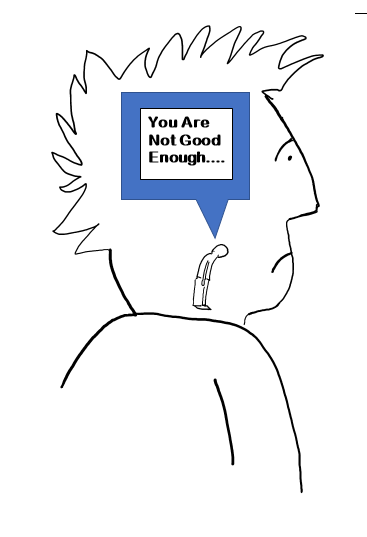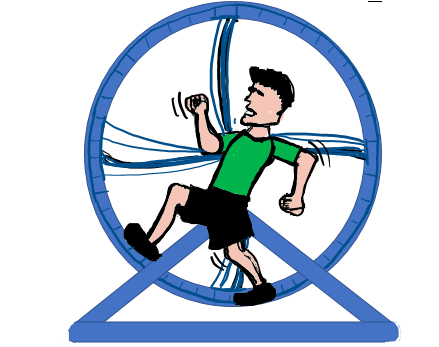PERFECTIONISM
What is Perfectionism?
The hall mark of perfectionism involves:
- The relentless striving for extremely high standards
- Judging your self-worth on your ability to achieve such standards.
- Continuing to set demanding goals, despite huge personal costs.
Many people think of perfectionism as something positive and is often seen as the pursuit of excellence.
Although such attitudes may help us achieve things in life, sometimes perfectionism can get in the way of our happiness and can actually impair performance. This is the paradox of perfectionism!
Perfectionistic Thinking
We interpret things according to what we expect. Perfectionists tend to be biased towards any evidence that they are not achieving. They often pick up errors in their work that others may not notice. Perfectionists also have an extreme view of what success and failure is, with no middle ground, causing them to judge themselves more harshly than others would. For example, “I might have well have failed…I only got a B”
Other beliefs and ways of thinking common to perfectionism include:
- Fear of failure (e.g., “If I did that, I’d be rubbish’).
- Shoulds & musts (e.g., “I should have a girlfriend by now”).
- All-or-nothing (e.g., “There is a right and a wrong way to do things”).
- Control (e.g., “I must be prepared for anything”).
- Black & white thinking: seeing only extremes – no shades of grey;
- Catastrophizing: blowing things out of proportion;
- Jumping to conclusions: assuming that we know what others are thinking, or can predict the future. See Negative Thinking Styles help page for more information.
Unhelpful thoughts are inflexible, rigid, and unreasonable. For example, the rule “I must never make mistakes” is impractical because it not possible or reasonable that we would be able to maintain this standard. This means we are likely to feel bad when we make a mistake or are unable to meet our ideals.
Unfortunately, even if a goal is achieved, most perfectionists do not feel happy about it for very long. Some might see it as a “fluke” or decide that the bar set was not high enough, and set a higher criteria the next time. Such patterns of thinking only reinforces this vicious cycle and diminishes self-worth.

To identify such unhelpful beliefs, ask yourself:
- What do I expect of myself?
- Do people think I am too self-critical?
- What might happen if I relax my standards?
- What do I criticise in other people? What standards do I expect them to live up to?
Adjusting & Challenging The Rules
Generating a more helpful rules for living involves seeing yourself and the world in a more balanced, adaptable and realistic way. When trying to put this into practice, work out how you would behave if you already accept the new more positive assumption. Often when we act as if something were true, we actually start to take it on board and believe it.
To challenge your perfectionistic beliefs, there are six steps to take:

- What are your unhelpful rules or assumptions?
- Where have they come from?
- Are they realistic or reasonable or achievable?
- Are there any negative aspects to these rules?
- Can you think more helpful kinder thoughts?
- Plan how you would need to act in everyday life to put this new helpful rule or assumption into practice
Remember, practice is very important, but remember you don’t have to achieve change ‘perfectly’ or even quickly.
Perfectionism and Behaviour
Perfectionism behaviours can be divided into two categories – the things you actively do as a result of your perfectionism and the things you avoid doing as a result of your perfectionism.
Active behaviours include:
- Seek reassurance constantly.
- Organise excessively and make lists.
- Not know when to stop. (For instance, arguing a point over and over)
- Constant checking.
- Slow to complete tasks
Active behaviours describe the more commonly held view of perfectionism, where people engage in actions that they see as necessary but that often seem excessive to other people.
Avoidant Behaviours include:
- Struggle to make decisions
- Give up easily.
- Procrastinate. (E.g., put off starting an assignment for fear that it won’t be good enough).
- Hoard.
- Slow to complete or even try things - avoiding situations in which you may ‘fail’.
Although avoidant behaviour may not seem like perfectionism, it is really the other side of the same coin. When perfectionists fear that they will not be able to reach their high standards, they may be too afraid of failure to try. Some may procrastinate by putting off a task, often indefinitely, while others will wait to the last minute before doing a task.
These behaviours keep perfectionistic thinking going because, if you keep behaving this way, you never have the opportunity to test out whether your perfectionistic thinking is true. These behaviours may be time-consuming, done at the expense of other important activities and may even delay or interfere with attempts to meet requirements.
Reducing Unhelpful Behaviours
Behavioural experiments in Facing Your Fears can help loosen the grip of your perfectionism and test out the accuracy of your beliefs by seeing what happens when you behave differently.
We encourage you to try reducing your perfectionism behaviours. You may be pleasantly surprised at how much more time you have, and how little it affects your performance!
Re-evaluating the Importance of Achieving
People who are perfectionists tend to be overly concerned with achievement and the pursuit of unrelenting standards. They often rely on their ability to achieve unrelenting standards as a basis on which to judge their self-worth. In turn, this can have a big impact on the balance of their lives.
The impact of Achievement to Judge Self-worth
Since perfectionists base their self-worth on their ability to achieve unrelenting standards, they tend to work extremely hard to achieve these standards. Perfectionists often perceive this as highly beneficial. They may argue that by focussing all their energy on one area they are more likely to achieve their standards. Indeed, because of their hard work they have the potential to perform well.
However, when people base much of their self-worth on only one thing in their lives, they are putting a tremendous amount of pressure on themselves to make sure that it works out. That’s why it’s not surprising that perfectionists tend to be overly focused on achieving the high standards they set themselves. Additionally they often feel stressed, irritable, depressed, anxious or guilty, and think negatively about themselves. When a goal is achieved they may feel relieved, but they don’t tend to feel happy for very long. In fact, perfectionists tend to dismiss their success (“I was just lucky”) or conclude that the standard set was too low (“anyone could have done that”) and re-set the standard higher for next time.

Tackling the Over-evaluation of Achieving
You may find it helpful to think about the amount of importance you place on each of the areas of your life that contribute to your self-worth.
If you find that your self-esteem overly relies on your ability to achieve, you may want to consider broadening your interests. This will give you a chance to develop other ways of feeling good about yourself, apart from the pursuit of those relentless high standards.
Identify the other areas of your life that may have once been important to your self-worth but have now taken a lesser place. Choose one area you would like to start with and then think of some activities you could engage in to help you do that.
You might find yourself thinking that you don’t feel like doing this activity and want to put it off until you feel ready. Don’t — act now! People often want to wait until they feel motivated before they act. However, an important thing to bear in mind is, motivation may not come on its own, but when you ACT first, motivation will then follow. You’ll soon find that your life will become more balanced if you remember:
ACTION before MOTIVATION
And you‘ll soon find that your life will be more balanced.